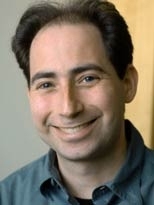David Kaiser, associate professor of the history of science for the Program in Science, Technology & Society (STS) and lecturer in the Department of Physics, received the 2005-2006 Harold E. Edgerton Faculty Achievement Award at the April 19 faculty meeting.
The faculty also heard revised family care policies, heard a report from the Committee on Discipline and reviewed the slate of nominees to faculty committees for the coming academic year.
The Edgerton award, a tribute to the late beloved inventor/photographer "Doc" Edgerton, recognizes exceptional distinction in teaching and research or scholarship in junior untenured faculty members.
Karen R. Polenske, professor of urban studies and planning and chair of this year's Edgerton Award Committee, made the announcement.
In her remarks, Polenske noted that she enjoyed Kaiser's recent book, "Drawing Theories Apart: The Dispersion of Feynman Diagrams in Postwar Physics," even though she is not a physicist, and that some of the diagrams reminded her of plans for shipping coal in China and railway lines in the Gulf Coast.
Kaiser completed Ph.D.s in physics and the history of science at Harvard University in 1997 and 2000, respectively. His physics research focuses on early-universe cosmology at the interface of particle physics and gravitation. His historical research focuses on changes in American physics after World War II, looking at how the post-war generation of graduate students was trained. Kaiser said he was "deeply honored and pleased" about the award, and also surprised, because his colleagues had brought him to the faculty meeting under false pretenses.
Family care policies
Lotte Bailyn, professor of management at the MIT Sloan School of Management, described revised faculty policies for family care. The Academic Council in 2001 approved three new family policies intended to help MIT faculty have productive careers while keeping up with their family responsibilities.
A tenure clock extension was instituted to make it possible for women faculty to bear children without losing the opportunity for tenure. In 2001, 52 percent of the women in the School of Engineering had children, while nationally, 82.5 percent of women age 40-44 had borne a child. At MIT in 1990, 82 percent of the male faculty had children, compared with 53 percent of the female faculty, according to a report of the Ad Hoc Committee on Family and Work, indicating that women faculty at MIT faced more constraints than male faculty in the choice to have children.
After a five-year review of the policies was completed in February, the committee recommended minor changes in wording and one substantive change, Bailyn said.
As before, any woman on the faculty who bears a child during her probationary period will have her tenure clock automatically extended by one year. The committee's substantive change was in adding a new possibility for women faculty who bear children: Upon request, they will be granted an additional year's extension for any additional child or children.
Under the new policy, adoptive parents and men, under some circumstances, can also request extensions of the tenure clock when children enter the family. As before, tenured faculty who need time for family care may apply for reduced-time, reduced-pay appointments, and parents who spend significant time on child care (now defined as 50 percent or more of the time they usually spend on academic work) will be granted release, with full pay, for one semester from teaching and administrative responsibilities to focus on their infants and on their graduate students.
Discipline report
Margery Resnick, associate professor of foreign languages and literature, gave a report from the Committee on Discipline, which hears cases of student infractions of Institute rules and policies, such as academic misconduct, hosting unregistered events, computer piracy, underage possession and consumption of alcohol and other transgressions. The committee only hears cases that are not handled by the Office of the Dean for Student Affairs, which deals with cases in which a student admits his or her guilt and, with the dean or a member of the dean's staff, comes up with an appropriate sanction.
Both the committee and the deans hear discipline cases. In the 2004-2005 academic year, sanctions included letters placed in students' files, probation, reimbursement for damaged property, and a single expulsion.
Resnick noted that women are catching up to men in the number of cases seen by the committee. Among the cases seen by the dean of students, very few involved freshmen, while most occurred among juniors.
The faculty approved restructuring of the Committee on Graduate School Policy as described at the March faculty meeting. Renamed the Committee on Graduate Programs, the committee, which handles tasks including recommending the adoption of new graduate degree programs and issuing formal complaints to underperforming graduate students, will shrink from 40 to six elected faculty members plus the associate chair of the faculty and two graduate student members, among other changes.
A version of this article appeared in MIT Tech Talk on April 26, 2006 (download PDF).






